无被动语态情况资料
- 格式:doc
- 大小:18.50 KB
- 文档页数:2
![高考英语科动词被动语态资料[最新版]](https://uimg.taocdn.com/b9a80665dd88d0d232d46a31.webp)
注:尊敬的各位读者,本文是笔者教育资料系列文章的一篇,由于时间关系,如有相关问题,望各位雅正。
希望本文能对有需要的朋友有所帮助。
如果您需要其它类型的教育资料,可以关注笔者知识店铺。
由于部分内容来源网络,如有部分内容侵权请联系笔者。
英语科动词被动语态资料第十一章被动语态和虚拟语气第一节被动语态一、复习旧课,讲评所做的练习二、导入新课:语态是表示句子的主语和谓语动词行为之间关系的动词形式。
英语的语态分为两种:主动语态和被动语态。
1.主动语态表示主语是谓语动词行为的发出者。
如:He killed the animal. 他杀死了那动物。
2.被动语态表示主语是谓语动词行为的承受者。
如:The animal was killed. 那动物被杀死了。
不及物动词一般不能用于被动语态;及物动词则一般都能用于被动语态,但也有一些不可,如:fit , have , hold (容纳), lack , own , suit 等等。
知识要点1.被动语态的构成:被动语态通常由助动词be+过去分词构成,行为的发出者可由介词by引出。
如:Houses are built by builders .房子是建筑工人盖的。
主动语态和被动语态的转换通常是将宾语变为主语,谓语动词变为被动式,主语变为介词by的宾语,其他成分一般保留不变(参见以下各例)。
如:Builders build houses. 建筑工人盖房子.Houses are built by builders. 房子是建筑工人盖的。
如:We can trust her . 我们可以信任她。
She can be trusted ( by us ) . 她可以(让我们)信任.2.被动语态的时态被动语态的时态由助动词be的各种时态形式+过去分词构成,常用者如下:(1)、一般现在时。
如:My car is parked near our house. (I park my car near our house . )我的车存在我家附近。
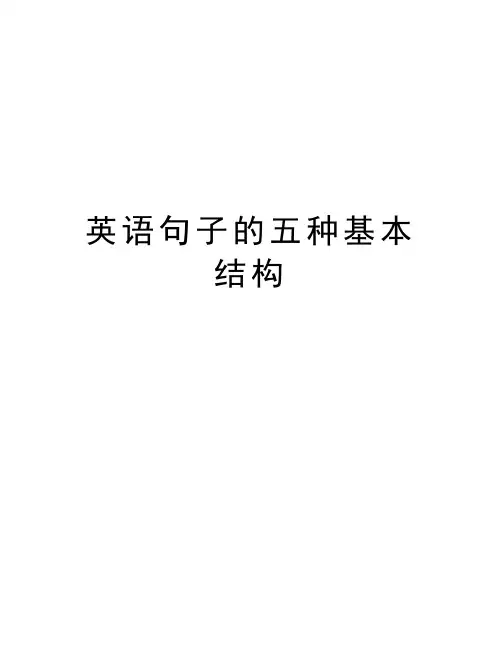
英语句子的五种基本结构英语句子的五种基本结构一、主谓结构The red sun rises in the east. This kind of paper tears easily. A tiger had got out.该句式中的谓语动词为不及物动词(vi.=intransitive verb),所以不能接宾语或补语,也没有被动语态,但可以接修饰成分,修饰主语的的---定语,修饰谓语的---状语。
主谓结构常用来表示主语的动作或状态。
练习一画出下列句子的成分。
1. In the last ten years great changes have taken place in my hometown.2. The girls came, dancing and laughing.3. At the meeting lots of problems concerning fund came up.4. In front of the house grows a tall tress with thick leaves and branches.5. It never occurred to me that he would come to help me.练习二翻译句子。
1. 我的英语水平提高了很多。
2. 昨晚,那座桥上发生了一起交通事故。
3. 一些孩子正在操场上高兴的玩耍。
4. 会议将在什么时候举行?5. 有多少国家要参加奥运会?二、主谓宾结构They laughed at the blind man. = The blind man was laughed at by them.They carried out the plan successfully. = The plan was carried out successfully by them.The nurse will take good care of your father. = Your father will be taken good care of by the nurse.练习一画出下列句子的成分。
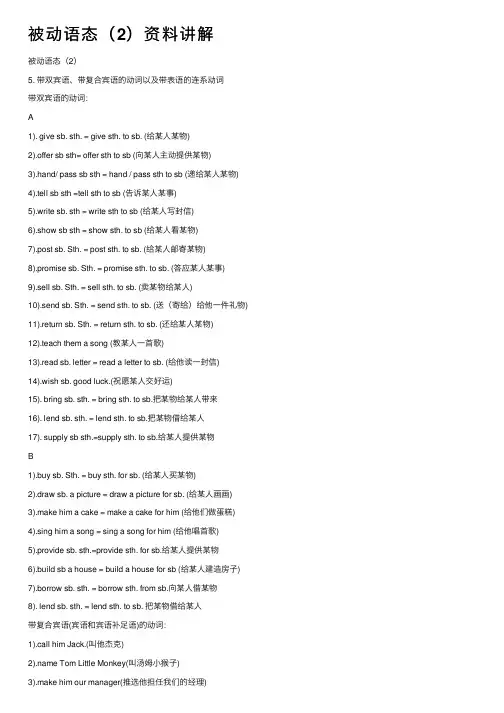
被动语态(2)资料讲解被动语态(2)5. 带双宾语、带复合宾语的动词以及带表语的连系动词带双宾语的动词:A1). give sb. sth. = give sth. to sb. (给某⼈某物)2).offer sb sth= offer sth to sb (向某⼈主动提供某物)3).hand/ pass sb sth = hand / pass sth to sb (递给某⼈某物)4).tell sb sth =tell sth to sb (告诉某⼈某事)5).write sb. sth = write sth to sb (给某⼈写封信)6).show sb sth = show sth. to sb (给某⼈看某物)7).post sb. Sth. = post sth. to sb. (给某⼈邮寄某物)8).promise sb. Sth. = promise sth. to sb. (答应某⼈某事)9).sell sb. Sth. = sell sth. to sb. (卖某物给某⼈)10).send sb. Sth. = send sth. to sb. (送(寄给)给他⼀件礼物)11).return sb. Sth. = return sth. to sb. (还给某⼈某物)12).teach them a song (教某⼈⼀⾸歌)13).read sb. letter = read a letter to sb. (给他读⼀封信)14).wish sb. good luck.(祝愿某⼈交好运)15). bring sb. sth. = bring sth. to sb.把某物给某⼈带来16). lend sb. sth. = lend sth. to sb.把某物借给某⼈17). supply sb sth.=supply sth. to sb.给某⼈提供某物B1).buy sb. Sth. = buy sth. for sb. (给某⼈买某物)2).draw sb. a picture = draw a picture for sb. (给某⼈画画)3).make him a cake = make a cake for him (给他们做蛋糕)4).sing him a song = sing a song for him (给他唱⾸歌)5).provide sb. sth.=provide sth. for sb.给某⼈提供某物6).build sb a house = build a house for sb (给某⼈建造房⼦)7).borrow sb. sth. = borrow sth. from sb.向某⼈借某物8). lend sb. sth. = lend sth. to sb. 把某物借给某⼈带复合宾语(宾语和宾语补⾜语)的动词:1).call him Jack.(叫他杰克)2).name Tom Little Monkey(叫汤姆⼩猴⼦)3).make him our manager(推选他担任我们的经理)4).make our country rich and strong(使我们的国家富强起来)5).make the children stay at home (使孩⼦们呆在家⾥)6).let him do the housework 让他⼲家务活)7).let the boy in/ out (让那个男孩进来、出去)8).have the machine running (让机器运转)9).have them work day and night(让他们⽇⽇夜夜⼲活)10).keep them waiting for a long time (让他们等很长时间)11).keep the students in their classroom (使学⽣在教室⾥)12).keep the room tidy and clean(保持房间整洁)13).find the door open(发现门是开着的)14). find(see/notice /observe/ hear/ feel ) the girl helping her mother do the housework (发现,看见,注意到,听见,感觉到那个⼥孩在帮她妈妈⼲家务活)15) . find(see/notice /observe/ hear/ feel ) his father repair the computer (发现,看见,注意到,听见,感觉到)他的⽗亲修好了电脑带表语的连系动词:1).look happy (显得, 看上去⾼兴)2).sound nice (听起来优美动听)3).taste terrible (吃起来,尝起来难吃)4).smell good (闻起来⾹)5).feel lucky(感到幸运)6).keep silent(保持安静)7).stay open(⼀直开着)8) .go hungry(挨饿)9).seem interesting(似乎有趣)10).The weather remains hot.(天⽓仍然很热)11). His dream came true.(他梦想成真)12).Our life is getting/ becoming better and better.(我们的⽣活变得越来越好)13). His face turned red.(他的脸变红了)14). The man grew angry. (那个⼈⽣⽓了)15). His father fell ill yesterday.他的⽗亲昨天⽣病了7. 带直接宾语和间接宾语的主动语态改为被动语态时有两种情况:①把间接宾语改为被动语态的主语,直接宾语仍保留原位;②把直接宾语改为主动语态的主语,此时,间接宾语前要加介词to或for。
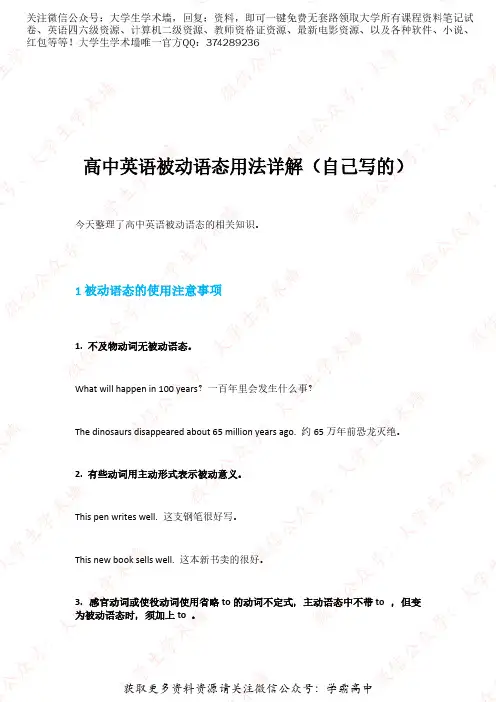
大:高中英语被动语态用法详解(自己写的)今天整理了高中英语被动语态的相关知识。
1被动语态的使用注意事项1. 不及物动词无被动语态。
What will happen in 100 years?一百年里会发生什么事?The dinosaurs disappeared about 65 million years ago. 约65万年前恐龙灭绝。
2. 有些动词用主动形式表示被动意义。
This pen writes well. 这支钢笔很好写。
This new book sells well. 这本新书卖的很好。
3. 感官动词或使役动词使用省略to的动词不定式,主动语态中不带to ,但变为被动语态时,须加上to 。
例:make somebody do something →somebody+ be +made to do something see somebody do something →somebody +be +seen to do somethingA girl saw my wallet drop when she passed by.→My wallet was seen to drop by a girl when she passed by. 一个女孩看到我的钱夹掉了当她经过的时候。
The boss made the little boy do heavy work.→The little boy was made to do heavy work by the boss. 这个老板让这小男孩干重活。
4. 如果是接双宾语的动词改为被动语态时,直接宾语(物)作主语,那么动词后要用介词,这个介词是由与其搭配的动词决定。
He gave me a book.→A book was given to me by him. 他给了我一本书。
He showed me a ticket.→A ticket was shown to me by him. 他给我展示了一张票。
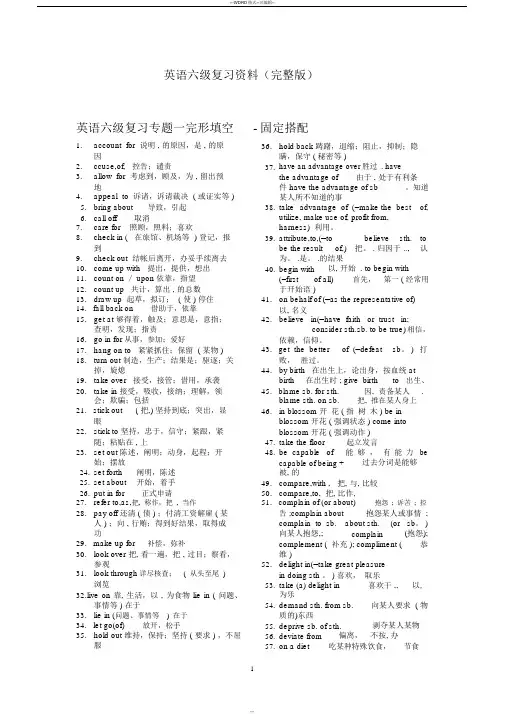
英语六级复习资料(完整版)英语六级复习专题一完形填空1.account for 说明 , 的原因,是 , 的原因use,of, 控告;谴责3.allow for 考虑到,顾及,为 , 留出预地4.appeal to 诉诸,诉请裁决 ( 或证实等 )5.bring about导致,引起6.call off取消7.care for 照顾,照料;喜欢8.check in ( 在旅馆、机场等 ) 登记,报到9.check out 结帐后离开,办妥手续离去e up with 提出,提供,想出11.count on / upon 依靠,指望12.count up 共计,算出 , 的总数13.draw up 起草,拟订; ( 使 ) 停住14. fall back on借助于,依靠15.get at 够得着,触及;意思是,意指;查明,发现;指责16.go in for从事,参加;爱好17.hang on to 紧紧抓住;保留 ( 某物 )18.turn out 制造,生产;结果是;驱逐;关掉,旋熄19.take over 接受,接管;借用,承袭20.take in 接受,吸收,接纳;理解,领会;欺骗;包括21. stick out( 把,) 坚持到底;突出,显眼22.stick to 坚持,忠于,信守;紧跟,紧随;粘贴在 , 上23.set out 陈述,阐明;动身,起程;开始;摆放24.set forth阐明,陈述25.set about开始,着手26.put in for正式申请27.refer to,as,把,称作,把,当作28.pay off 还清 ( 债 ) ;付清工资解雇 ( 某人 ) ;向 , 行贿;得到好结果,取得成功29. make up for补偿,弥补30.look over 把, 看一遍,把 , 过目;察看,参观31.look through详尽核查;(从头至尾)浏览32.live on 靠, 生活,以 , 为食物 lie in ( 问题、事情等 ) 在于33.lie in (问题、事情等)在于34. let go(of)放开,松手35.hold out 维持,保持;坚持 ( 要求 ) ,不屈服-固定搭配36.hold back 踌躇,退缩;阻止,抑制;隐瞒,保守 ( 秘密等 )37.have an advantage over胜过. havethe advantage of由于 , 处于有利条件 have the advantage of sb。
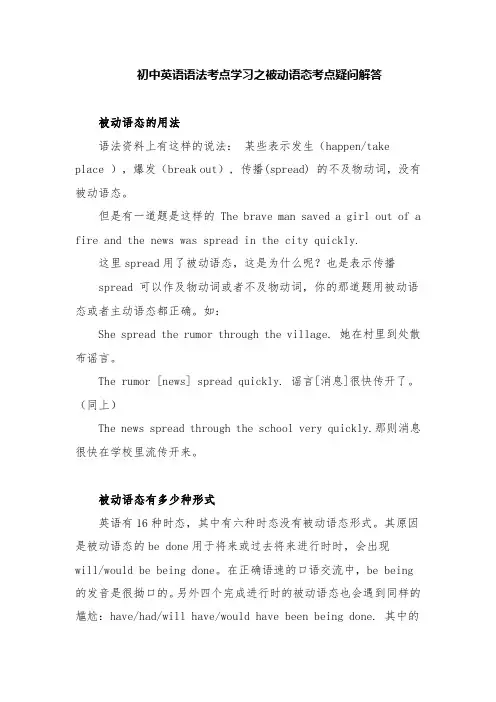
初中英语语法考点学习之被动语态考点疑问解答被动语态的用法语法资料上有这样的说法:某些表示发生(happen/take place ),爆发(break out), 传播(spread) 的不及物动词,没有被动语态。
但是有一道题是这样的 The brave man saved a girl out of a fire and the news was spread in the city quickly.这里spread用了被动语态,这是为什么呢?也是表示传播spread 可以作及物动词或者不及物动词,你的那道题用被动语态或者主动语态都正确。
如:She spread the rumor through the village. 她在村里到处散布谣言。
The rumor [news] spread quickly. 谣言[消息]很快传开了。
(同上)The news spread through the school very quickly.那则消息很快在学校里流传开来。
被动语态有多少种形式英语有16种时态,其中有六种时态没有被动语态形式。
其原因是被动语态的be done用于将来或过去将来进行时时,会出现will/would be being done。
在正确语速的口语交流中,be being的发音是很拗口的。
另外四个完成进行时的被动语态也会遇到同样的尴尬:have/had/will have/would have been being done. 其中的been being是非常拗口的。
因此,现代英语中这六种时态不用被动语态。
当将来或过去将来进行时需要用被动语态时,用一般将来或过去将来时的被动语态形式代替。
四个完成进行时的被动语态用完成时的被动语态代替。
因此,现代英语中被动语态有10种时态形式(不是10中被动语态):四个一般时,四个完成时,现在进行时,过去进行时。
It is doneit was done.It will be done.It would be done.It has been done.It had been done.It will have been done.It would have been done.It is being done.It was being done.除了除了十种时态形式外,被动语态还可用于情态动词之后,其形式同will/would后的被动语态形式。
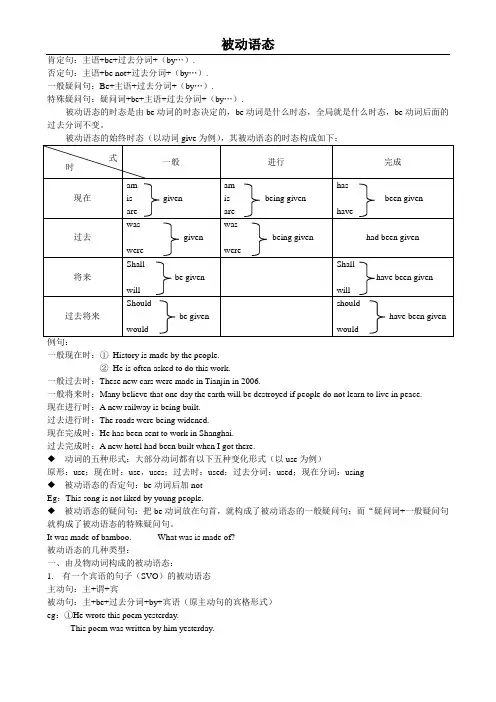
肯定句:主语+be+过去分词+(by…).否定句:主语+be not+过去分词+(by…).一般疑问句:Be+主语+过去分词+(by…).特殊疑问句:疑问词+be+主语+过去分词+(by…).被动语态的时态是由be动词的时态决定的,be动词是什么时态,全局就是什么时态,be动词后面的过去分词不变。
被动语态的始终时态(以动词give为例),其被动语态的时态构成如下:例句:一般现在时:①History is made by the people.②He is often asked to do this work.一般过去时:These new cars were made in Tianjin in 2006.一般将来时:Many believe that one day the earth will be destroyed if people do not learn to live in peace.现在进行时:A new railway is being built.过去进行时:The roads were being widened.现在完成时:He has been sent to work in Shanghai.过去完成时:A new hotel had been built when I got there.◆动词的五种形式:大部分动词都有以下五种变化形式(以use为例)原形:use;现在时:use,uses;过去时:used;过去分词:used;现在分词:using◆被动语态的否定句:be动词后加notEg:This song is not liked by young people.◆被动语态的疑问句:把be动词放在句首,就构成了被动语态的一般疑问句;而“疑问词+一般疑问句就构成了被动语态的特殊疑问句。
It was made of bamboo.---------What was is made of?被动语态的几种类型:一、由及物动词构成的被动语态:1.有一个宾语的句子(SVO)的被动语态主动句:主+谓+宾被动句:主+be+过去分词+by+宾语(原主动句的宾格形式)eg:①He wrote this poem yesterday.--------This poem was written by him yesterday.②Thousands of tourists will visit Kunming this year.---------Kunming will be visited by thousands of tourists this year.2.有两个宾语的句子(SVOO)的被动语态主动句:主+谓+间接宾语+直接宾语被动句:主(原间接宾语)+be + 过去分词+原(直接宾语)+by+ 原主语的宾格主(原直接宾语)+be+ 过去分词+原(间接宾语)+by+原主语的宾格注意:用直接宾语做被动语态的主语时,保留在过去分词后面的保留宾语之前可加一个适当的介词,如to,for,of等,以加强间接宾语的语气(这种被动形式较常用,必须牢记)。
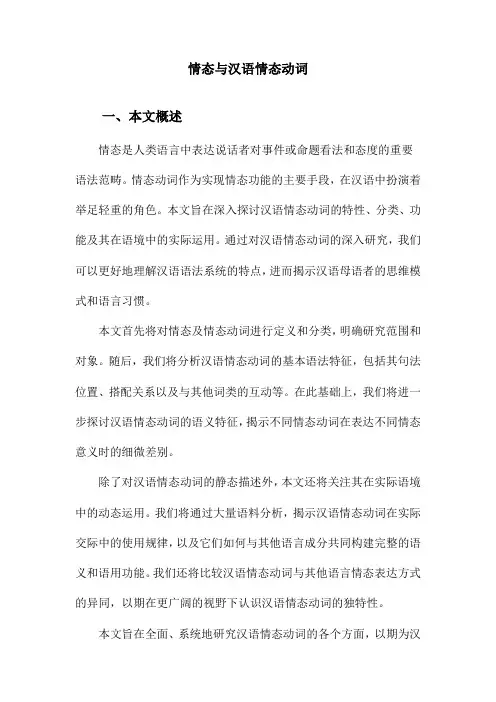
情态与汉语情态动词一、本文概述情态是人类语言中表达说话者对事件或命题看法和态度的重要语法范畴。
情态动词作为实现情态功能的主要手段,在汉语中扮演着举足轻重的角色。
本文旨在深入探讨汉语情态动词的特性、分类、功能及其在语境中的实际运用。
通过对汉语情态动词的深入研究,我们可以更好地理解汉语语法系统的特点,进而揭示汉语母语者的思维模式和语言习惯。
本文首先将对情态及情态动词进行定义和分类,明确研究范围和对象。
随后,我们将分析汉语情态动词的基本语法特征,包括其句法位置、搭配关系以及与其他词类的互动等。
在此基础上,我们将进一步探讨汉语情态动词的语义特征,揭示不同情态动词在表达不同情态意义时的细微差别。
除了对汉语情态动词的静态描述外,本文还将关注其在实际语境中的动态运用。
我们将通过大量语料分析,揭示汉语情态动词在实际交际中的使用规律,以及它们如何与其他语言成分共同构建完整的语义和语用功能。
我们还将比较汉语情态动词与其他语言情态表达方式的异同,以期在更广阔的视野下认识汉语情态动词的独特性。
本文旨在全面、系统地研究汉语情态动词的各个方面,以期为汉语语法研究和语言教学提供有价值的参考。
二、情态的基本概念情态,简单来说,是指语言表达中体现出的说话者对事件或状态的主观态度和看法。
在语言学中,情态是一个复杂而重要的概念,它涉及到语言的表达功能、人际交流以及语境等多个方面。
在汉语中,情态主要通过情态动词、助动词、语气词以及一些特定的语法结构来表达。
情态动词是汉语中表达情态的主要手段之一。
它们不仅具有表示时态的功能,更重要的是能够表达说话者对事件或状态的主观态度和看法。
例如,“能”“会”“应该”“必须”等情态动词,在句子中能够表示能力、可能性、义务、推测等多种情态意义。
除了情态动词外,助动词和语气词也是汉语中表达情态的重要手段。
助动词如“要”“得(děi)”“敢”等,通常与情态动词配合使用,进一步丰富情态的表达。
而语气词如“了”“呢”“吧”等,则通过改变句子的语气,来传达说话者的情感态度和语气。
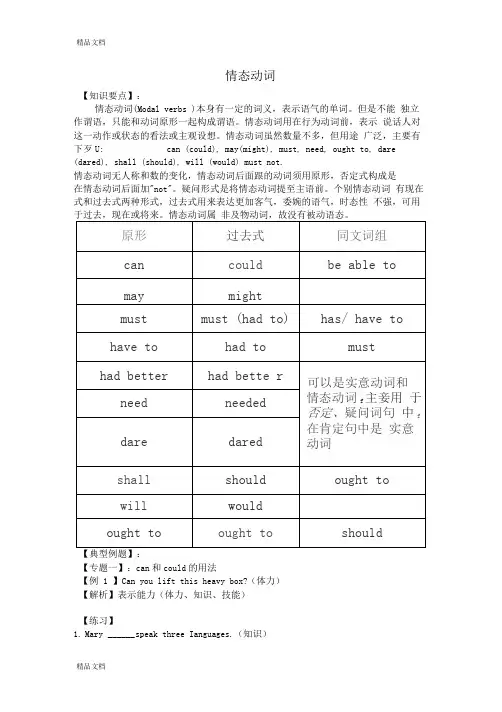
情态动词【知识要点】:情态动词(Modal verbs )本身有一定的词义,表示语气的单词。
但是不能独立作谓语,只能和动词原形一起构成谓语。
情态动词用在行为动词前,表示说话人对这一动作或状态的看法或主观设想。
情态动词虽然数量不多,但用途广泛,主要有下歹U: can (could), may(might), must, need, ought to, dare (dared), shall (should), will (would) must not.情态动词无人称和数的变化,情态动词后面跟的动词须用原形,否定式构成是在情态动词后面加"not"。
疑问形式是将情态动词提至主语前。
个别情态动词有现在式和过去式两种形式,过去式用来表达更加客气,委婉的语气,时态性不强,可用【典型例题】:【专题一】:can和could的用法【例 1 】Can you lift this heavy box?(体力)【解析】表示能力(体力、知识、技能)【练习】1.Mary ______ s peak three Ianguages.(知识)2. ___ you skate?(技能)此时可用be able to代替。
Can只有一般现在时和一般过去式;而be able to 则有更多的时态。
I' ll not be able to come this after noon.当表示“经过努力才得以做成功某事”时应用be able to,不能用Can。
【例2】-- Can I go now?—— Yes, you can. / No, you can ' t.【解析】表示请求和允许。
此时可与may互换。
在疑问句中还可用could,might 代替,不是过去式,只是语气更委婉,不能用于肯定句和答语中。
【练习】---- ______ I come to see you tomorrow?---- Yes, you ____ .---- No, you ____ /I ' m afraid not.【例3】Can this be true?【解析】表示推测(惊讶、怀疑、不相信的态度),用于疑问句、否定句和感叹句中。
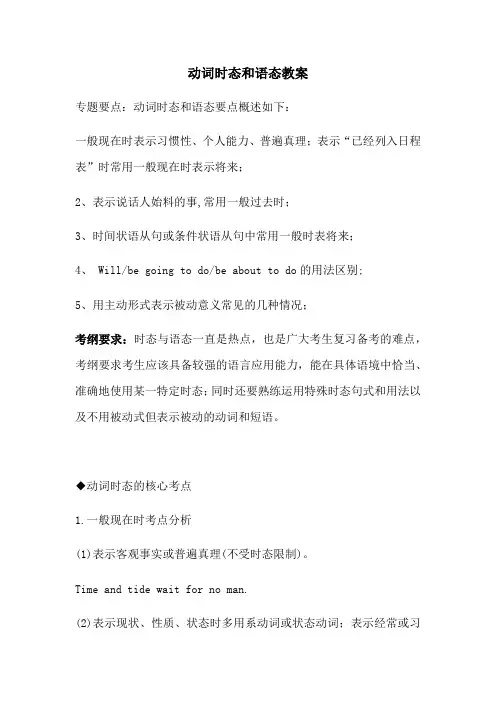
动词时态和语态教案专题要点:动词时态和语态要点概述如下:一般现在时表示习惯性、个人能力、普遍真理;表示“已经列入日程表”时常用一般现在时表示将来;2、表示说话人始料的事,常用一般过去时;3、时间状语从句或条件状语从句中常用一般时表将来;4、 Will/be going to do/be about to do的用法区别;5、用主动形式表示被动意义常见的几种情况;考纲要求:时态与语态一直是热点,也是广大考生复习备考的难点,考纲要求考生应该具备较强的语言应用能力,能在具体语境中恰当、准确地使用某一特定时态;同时还要熟练运用特殊时态句式和用法以及不用被动式但表示被动的动词和短语。
◆动词时态的核心考点1.一般现在时考点分析(1)表示客观事实或普遍真理(不受时态限制)。
Time and tide wait for no man.(2)表示现状、性质、状态时多用系动词或状态动词;表示经常或习惯性的动作,多用动作动词,且常与表频率的时间状语连用。
They always care for each other and help each other.(3)表示知觉、态度、感情、某种抽象的关系或概念的词常用一般现在时:see,hear,smell,taste, feel, notice, agree, believe, like, hate, want, think, belong to, seem 等。
Smith owns a car and a house.All the students here belong to No.1 Middle School(4)在时间、条件状语从句中常用一般现在时代替将来时。
但要注意由if引导的条件状语从句中可以用shal或will表“意愿”,但不表示时态。
If you will accept my invitation and come to our party, my family will be pleased。
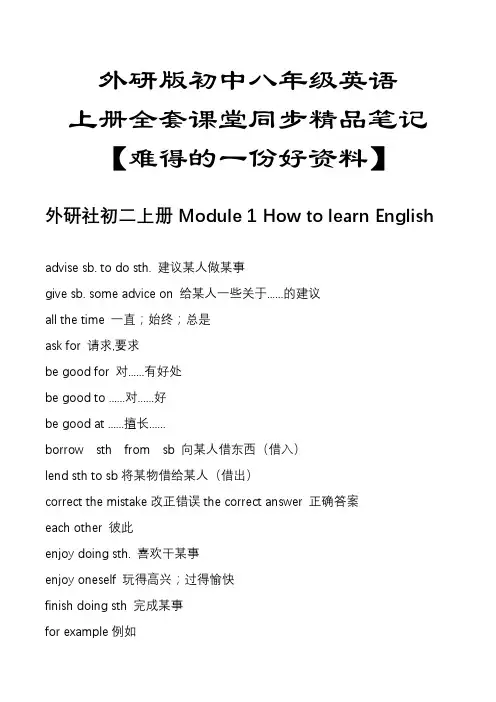
外研版初中八年级英语上册全套课堂同步精品笔记【难得的一份好资料】外研社初二上册Module 1 How to learn Englishadvise sb. to do sth. 建议某人做某事give sb. some advice on 给某人一些关于......的建议all the time 一直;始终;总是ask for 请求,要求be good for 对......有好处be good to ......对......好be good at ......擅长......borrow sth from sb 向某人借东西(借入)lend sth to sb将某物借给某人(借出)correct the mistake改正错误the correct answer 正确答案each other 彼此enjoy doing sth. 喜欢干某事enjoy oneself 玩得高兴;过得愉快finish doing sth 完成某事for example例如forget to do sth. 忘记做某事forget doing sth. 忘记做过某事help sb (to)do sth =help sb with sth帮某人做某事in class在课堂上in pairs成双;成对last term 上学期leave sth. at home把某物忘在家里learn......from...... 向...学习make a list列表;制表;编目录make a mistake犯错make friends 交朋友next term 下学期next to在......旁边practice doing sth 练习做某事read a newspaper读报纸remember to do sth. 记住要干某事remember doing sth. 记住干过某事show sb. around 带领某人参观speak English as much as possible尽可能多说英语speak English in class在课堂上说英语take a deep breath 深呼吸talk about 谈论think about 考虑this term这学期translate …into 把......译成try to do sth. 尽力做某事/试用做某事try not to do sth 尽量不要做某事/尝试不要做某事Welcome back to school欢迎回到学校【重点句型】1、Why don’t you write it down?这里的“Why don’t you do ...?”是用来表示提出某种建议,而不是询问为什么不做某事的原因。
2014届中考英语最后一课2014/6/10 Part1:考点梳理考点概述:1.冠词2. 连词3.介词4.名词5.代词6. 形容词和副词7.动词短语8.同义词辨析9. 疑问词10.数词11.感叹句12.连系动词13.情态动词14.非谓语动词15.选择疑问句16.宾语从句17. 被动语态18. 特殊句型和固定结构19. 延续性与短暂性动词20. 交际用语详细介绍:1. 冠词(a, an, the, /)2.连词:a) and, but , or, sob) though/although, unless =if ---not-c) until, when, before, after, while,as, as soon as ,sinced) because of, because, as, since,soe) so---that---, so that, too---to---f) that, if/whether, what, how, when3.介词:a)时间前的介词:in, on, at, until, during, after, before, since, forb)方位介词:through, past, over, across, along, around, below, above, under, between---and---, among, from---to---c) except, besides, including, instead of, like, with, without4. 名词:a)不可数名词:advice, news, information, weather, work, funb)集体名词:the police, the family, peoplec)单复同形: sheep, fishd)名词所有格:’s // s’Teachers’ Day Children’s Day Mother’s Daye) 复合名词:women / men teachers,sports meeting, boy studentsf) 名词复数: -ves, -oes,-iesg) 特殊变化:feet, women, teeth, childrenGermans, Walkmans, humans5.代词:a)人称代词、物主代词、反身代词、指示代词b)不定代词: some any noall, none, any, every, anotherboth, neither, either, each, the othersomething, anything, nothing, everythingsomebody, anybody, nobody, everybodysomeone, anyone, no one, everyone区别:1)none, no one, nothing2)everyone, every one of3)none, not all/all not/not every4) it, one, ones, that5) so, such, neither, nor6. 形容词、副词比较等级构成:双写:wetter, fatter, sadder, bigger, thinner, slimmest, hotter不规则:bad/badly/ill-worse-worst good/well-better-bestlittle-less-leastfar-farther/ further –farthest/ furthestold- older/elder多音节:expensive-more ~- most ~-less ~- least ~healthier, more healthily形容词修饰人或物:sunny, cloudy, windy, rainyfriendly, daily, weekly-ful, -less;un-/ im-/dis-/in-/ir--ed/-ing: excited/ excitingpleased/ pleasant// pleasure (n.)副词修饰动词、形容词等:badly, sadly, angrily, easily ,politely-ple/ -ble/ -tle: terribly, simply, gently*true-truly形容词、副词比较等级a)同级比较:as---as---not ---as/so---as---A is like B. / A andB are alike.the same as---/ different from---A is the same size as B.b)比较级: much, a little, even, far ----than---/ the taller of the twoThe more----, the better----more and more beautiful; better and betterc)最高级of/ among/in; the+序数词+最高级;one of+the+最高级+n.复数区别:than any---; than any other---; than any other +n.单数=than the other +n.复数7. 动词短语:put up/put away/ put on/ put off/ put outlook up/look over/look for/ look afterturn up/turn down/turn on/turn offhave been to/ have gone to/ have been ingive out分发,散发/ give awa y赠送,分发,泄露/ give up放弃/ give in屈服take off脱下,起飞/ take down 取下/ take out取出/ take away拿走,夺走,拆去/ take in吸进8. 同义词辨析:spend/ cost/ pay/ takeborrow/lend/keep/forget/leave; take/bring/get/carrywear/ dress/put on/ try onsay/speak/ tell/ call/ talkarrive in(at)/ get to/ reachthe reason for / the cause ofa number of/ the number offew/little/a few/ a little (only, just, still+肯)alone/lonelyasleep/sleepydie/dying/be dead/deathused to do sth./ be used to doing sth./ be used to do/for doing sth.both---and---/ not only---but also---neither---nor---/ either---or---9.同形不同义的词用法辨析:if: 1)“如果”,主句将来,从句现在。
被动语态复习“三步曲”被动语态是动词语态的一种形式,表示主语是动作的承受者。
在历年的中考题中,都有一定数量的考查被动语态的题目。
因此,有必要对被动语态进行系统复习。
第一曲:掌握被动语态的结构被动语态由"助动词+及物动词的过去分词"构成。
不同时态的被动语态的差异主要体现在助动词be的变化上,同时助动词be还要在人称和数上与主语保持一致。
现将初中阶段常见的几种时态的被动语态总结如下:1.一般现在时的被动语态:am/is/are+done(指及物动词的过去分词,下同)如:English is used all over the world.2.一般过去时的被动语态:was/were+done如: The picture was painted two years ago.3.现在进行时的被动语态:am/is/are+being+done如: The flowers are being watered by them now.4.现在完成时的被动语态:have(has)+been+done如:The room has been cleaned.5.一般将来时的被动语态:will/be going to+be+done如:The work will be finished tomorrow.6.含有情态动词的被动语态:情态动词+be+done如:Your homework must be handed in today.其它几种特殊句型:It is said that …….. It is well known that ……. It is reported that……..have sth done第二曲:掌握主动语态变被动语态的方法把主动语态变为被动语态时,应走好以下三步:1)主动语态的宾语变为被动语态的主语; 2)主动语态的谓语动词由主动语态形式变为被动语态形式; 3)主动结构的主语变为介词by的宾语,组成介词短语,放在被动结构的谓语动词之后。
第一部分语法知成考专升本英语-考点汇编识第一章名词一、可数名词的复数形式(一)、规则的变复数方法1、一般情况,直接+steacher---teachers ;student---students ;father---fathers ;mother---mothers2、s,x,ch,sh 结尾的单词+esdress---dresses ;box---boxes ;match---matches ;dish---dishes3、以辅音字母+y 结尾的单词:变y 为i,+escity---cities;baby---babies boy---boys*辅音字母判断方法:26个字母中,5个元音:A 、E 、I 、O 、U ,21个辅音:26-5=21个4、以“o”结尾的单词,(1)以"辅音字母+o"结尾的单数名词后+eshero---heroes;mango---mangoes;potato---potatoes;tomato---tomatoes(2)以"元音字母+o"结尾的单数名词后加+szoo---zoos bamboo----bamboos(3)某些外来词,只在词尾+sphoto----photos;piano----pianos5、以f 、f e 结尾的单词,(1)大多数变f 、f e 为“v”+es妻子:wife---wives小刀:knife---knives 狼:wolf---wolves小偷:thief---thieves架子:shelf---shelves自己:self---selves生命:life---lives一半:half---halves叶子:leaf---leaves(2)少部分直接+sroof---roofs屋顶;belief---beliefs信仰;proof---proofs证明;校样*记忆口诀:妻子拿刀去砍狼、小偷吓得发了慌、躲在架后保己命、半片树叶遮目光。
无被动语态的情况
1) 不及物动词或动词短语无被动语态:
appear, die, disappear, end , fail, happen, last, lie, remain, sit, spread, stand ,break out, come true, fall asleep, keep silence, lose heart, take place.
比较:rise, fall, happen是不及物动词;raise, seat是及物动词。
(错) The price has been risen.
(对) The price has risen.
(错) The accident was happened last week.
(对) The accident happened last week.
(错) The price has raised.
(对) The price has been raised.
(错) Please seat.
(对) Please be seated.
2) 不能用于被动语态的及物动词或动词短语:
fit, have, hold, marry, own, wish, cost, notice, watch agree with, arrive at / in, shake hands with, succeed in, suffer from, happen to, take part in, walk into, belong to,listen to,walk into,fall off This key just fits the lock.
Your story agrees with what had already been heard.
3) 系动词无被动语态:
appear, be, become, fall, feel, get, grow, keep, look, remain, seem, smell, sound, stay, taste, turn It sounds good.
4. 祈使句一般没有被动语态。
如:
正:Look at the blackboard,please.
误:The blackboard is looked at by you.
5. 宾语和主语所指的对象相同时不能用于被动语态。
如:
正:We must help each other.
误:Each other must be helped by us.
6. 某些及物动词的宾语表示处所、地点、组织时不能用于被动语态。
如:
正:He joined the League in 1998.
误:The League was joined by him in 1998.
7. 动词不定式或动词-ing形式作宾语时不能用于被动语态。
如:
正:They like to watch TV.
误:To watch TV is liked by them.
正:He enjoys listening to the radio.
误:Listening to the radio is enjoyed by him.
8. 主动句中有表示数量、长度、大小或程度的单词或短语作宾语时往往不使用被动语态。
如:
正:She pays three yuan for the tomatoes.
误:Three yuan is paid for these tomatoes by her.
9. 由“动词+名词”构成的英语习语(如make faces,make friends,take place等)一般不可改为被动语态。
如:
正:The boy make faces in class.
误:Faces are made by the boy in class.
10. 反身代词在句中作宾语时,不能用被动语态。
如:
正:You must look after yourself.
误:Yourself must be looked after.
句子改错:
1. The boy was made cry by his sister.
2. The strange was let to go.
3. My coat is washed easily.
4. Her forehead is felt hot. I’m afraid she is ill.
5. Eggs won’t be kept long in summer.
6. Who was the book written?
7. English is not easy to be learnt.
8. The traffic accident was happened yesterday.
9. This desk needs to mend.
10. The People’s Republic of China was found on October 1, 1949.
11. Wet clothes are often hanged up near a fire in rainy weather.
12. Newly-born babies are taken good care in hospital.
13. The price has been risen.
14. Please seat.
15. I’ll come after the meeting if time is permitted.
16. A red sky in the morning says to be a sign of bad weather.
17. He is looked down because he is a liar.
18. A dictionary shall be given me by Father on my birthday.
19. An interesting story was told me last night.
20. They have married for 2 years.
21. I have got used to get up at six.
22.The book is well worth to be read.
23. He was laughed by them.
24. I was made do it.
25. Maths is difficult to be learned.
26. Great changes have been taken place.
27. I still don’t know what was happened just now.
28. The price of the cleaner has been risen quickly.
29. He read it as loud as possible so as to make himself hear.。